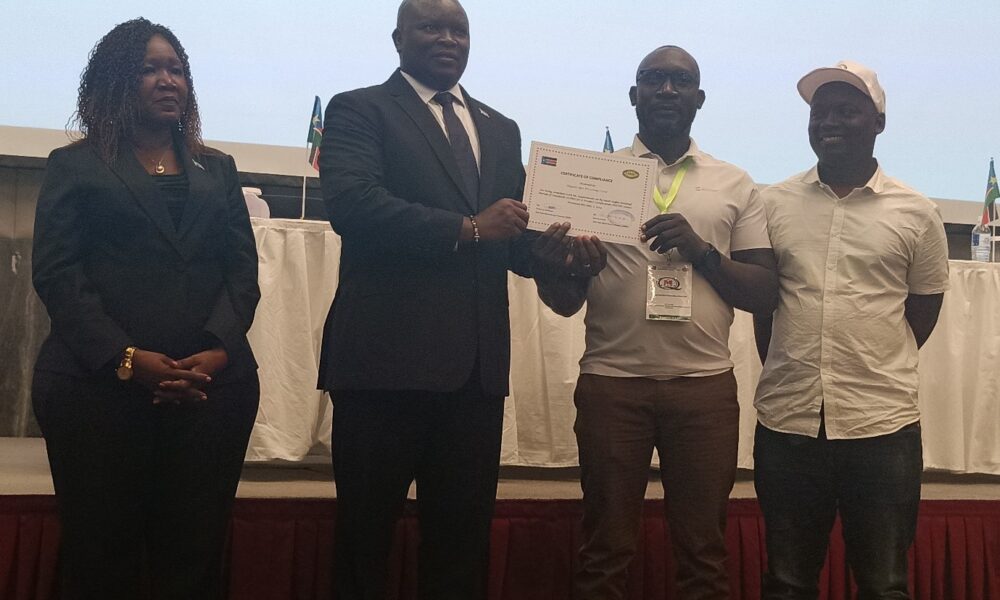By Kei Emmanuel Duku
In a move to protect consumers and boost exports, the South Sudan National Bureau of Standards (SSNBS) has certified Hagana Agro Processing Company and Aram Weer Organic.
Following inspections and testing, the companies received certification for their products: Hagana for refined, packaged, and processed honey and peanut butter while Aram Weer Organics for Nilotic Shea Butter products.
This certification allows both companies to sell locally and export internationally without restrictions.
Estella Malek, CEO of Aram Weer Organic, highlighted the difficulties she previously faced when exporting.
“Customers often request quality checks, and the only way to verify certification is through the mark,” she said. “This is a great day for my business. We can now scale our products internationally; it’s like a passport for my products.”
Malek pointed out the struggles faced by many Small and Medium Enterprises (SMEs) whose goods are often impounded in neighbouring countries due to a lack of certification from South Sudan.
“In the absence of a South Sudanese trademark, I sometimes apply for certification in partner countries, but it’s a costly process,” she explained.
“We’ve attempted to export, but products reaching East Africa are subjected to further inspections if they lack the quality mark, making them expensive and failing to meet international standards.”
Malek emphasized the superior quality of Nilotic Shea Butter from South Sudan, Uganda, and Kenya compared to West African perineum Shea Butter, which is in high demand in the European market.
Nilotic Shea Butter has uses beyond cosmetics, extending to the pharmaceutical industry.
With a current production capacity of 1,000 kilograms daily, Malek is now targeting the European market.
Another SME entrepreneur pursuing certification who identified herself only as echoed the importance of quality marks.
“The mark creates trust between consumers, retailers, and producers,” she said. “It protects buyers from fake products.”
Regina deals in honey, beeswax, Shea Butter, and sesame oil. Her biggest demand comes from Canada and Australia, and she exports every six months due to restrictions within the East African region.
“The local market is challenging,” she admitted, “but exporting internationally is fantastic. By reaching Europe, we want to showcase our products and share them with the world.”
Kout Madhor Kuot, Director of Planning and National Coordinator of the International Trade Centre (ITC) at the Ministry of Trade and Industry, highlighted the significance of the National Quality Policy, developed last year but not yet passed into law.
“The certification and quality mark will facilitate exports,” he said.
“Producers can sell locally, regionally, and globally. It also helps the SSNBS maintain records of South Sudan’s exports and quality.”
Kuot emphasized the role of these initiatives in building trust within the region and preventing issues faced by South Sudanese traders due to a lack of compliance with standards. “This allows our businesses to compete at the global level,” he concluded.
Whereas, Kenndy Kenyi Lodiong, Secretary General of the South Sudan Manufacturers Association (SSMA), pointed to the National Investment and Export Strategy, which identifies gum Arabic, honey, Shea Butter, leather, oil seeds, and packaging materials as potential export opportunities for South Sudanese traders.
Lodiong urged stakeholders to collaborate in increasing South Sudan’s export volume with the launch of the certification and quality mark program.
“The SSNBS needs to create a conducive environment for manufacturers,” he said.
“I encourage the private sector to take advantage of these opportunities and venture into value addition to maximize their returns.”

